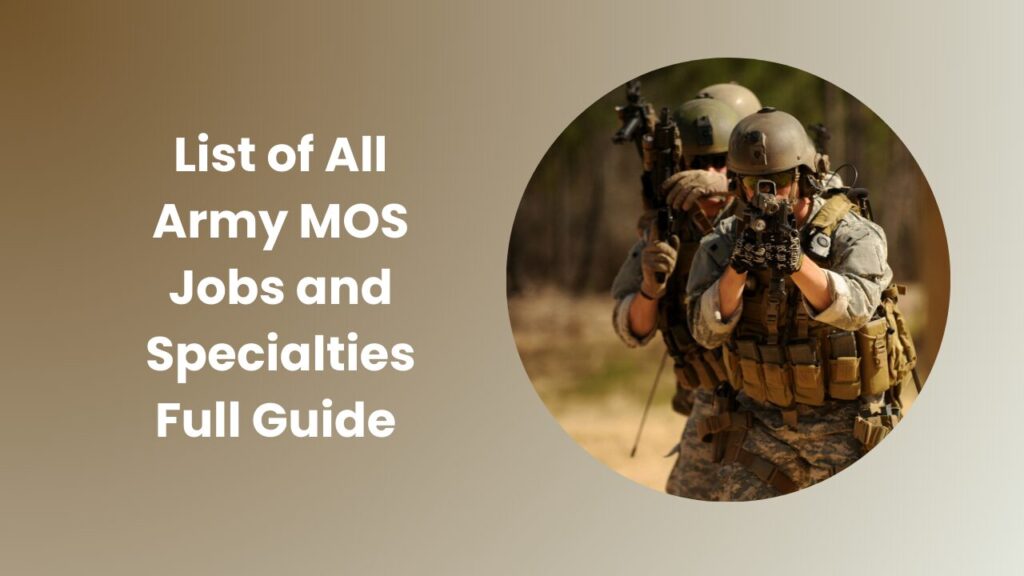The United States Army operates as one of the most structured and diverse branches of the military, relying on carefully defined career paths known as Military Occupational Specialties (MOS). Every soldier is assigned an MOS code that represents their unique role, responsibilities, and training requirements. Understanding the list of all Army MOS is important for anyone considering enlistment or researching military careers, as it provides a clear picture of the opportunities available within the Army. From combat roles to technical support, logistics, intelligence, medical, and engineering, each MOS serves a vital function in keeping the Army operational and effective. This guide explains the major Army MOS categories in detail and highlights the critical contributions of each specialty.
What Is an Army MOS?
Before exploring the complete list of all Army MOS, it is important to understand what the term means. MOS stands for Military Occupational Specialty, a code used to identify specific jobs within the Army. Each MOS includes not only the role itself but also the training path, responsibilities, and the type of missions a soldier will support. For example, while one MOS may involve operating advanced weaponry in direct combat, another may focus on analyzing intelligence or providing medical treatment to fellow soldiers. The Army uses MOS codes to streamline training, improve efficiency, and ensure every soldier is placed where their skills can have the greatest impact.
Army Combat MOS
Infantry (11B)
Infantry soldiers are the backbone of the Army’s combat operations. Their primary role is to engage in direct ground combat, often being the first to move into hostile areas. They train extensively in weapons, tactics, and survival skills, allowing them to operate in diverse environments ranging from dense urban centers to remote wilderness. Beyond fighting on the front lines, infantry soldiers are also responsible for securing territory, defending positions, and conducting reconnaissance missions. This MOS requires both physical endurance and mental resilience, as infantry soldiers must be prepared to handle intense battlefield situations.
Cavalry Scout (19D)
Cavalry scouts specialize in reconnaissance and gathering intelligence on enemy movements. Their role is critical because they provide commanders with the information needed to make strategic battlefield decisions. Scouts operate both mounted and dismounted, often moving ahead of larger forces to detect threats and report findings. They are trained to use advanced surveillance technology, maps, and communication tools while remaining hidden from enemy detection. The cavalry scout MOS demands quick thinking, adaptability, and the ability to operate independently under challenging conditions.
Armor Crewman (19K)
Armor crewmen are responsible for operating and maintaining the Army’s main battle tanks. They serve as part of a tank crew, working together to maneuver these massive vehicles in combat scenarios. Their duties include driving, loading ammunition, operating weapons systems, and ensuring the tank remains combat-ready. The role requires technical knowledge, teamwork, and a strong understanding of armored warfare tactics. Armor crewmen play a decisive role in providing heavy firepower support during military engagements, ensuring that infantry and scouts can operate with greater protection.
Army Intelligence MOS
Intelligence Analyst (35F)
Intelligence analysts process and evaluate information collected from multiple sources to identify enemy capabilities and intentions. Their work is vital for shaping the Army’s strategy and ensuring the safety of troops in combat zones. Analysts often deal with classified materials and use advanced computer systems to organize and interpret data. They also provide reports and briefings to commanders, allowing them to make informed operational decisions. This MOS demands strong analytical thinking, attention to detail, and the ability to handle sensitive information responsibly.
Human Intelligence Collector (35M)
Human intelligence collectors specialize in gathering information through direct interaction with individuals. This can include interrogating captured enemy personnel, debriefing soldiers returning from missions, and building relationships with local populations. Their insights often reveal critical details that cannot be obtained through technology alone. Human intelligence collectors must possess excellent communication skills, cultural awareness, and the ability to read people effectively. The role is both challenging and rewarding, as it directly influences the Army’s ability to anticipate and counter enemy actions.
Army Medical MOS
Combat Medic Specialist (68W)
Combat medics are often referred to as the lifeline of the battlefield. Their primary responsibility is to provide emergency medical treatment to soldiers injured in combat. They are trained to stabilize patients, perform basic lifesaving procedures, and prepare casualties for evacuation. Beyond the battlefield, combat medics also support routine healthcare needs within their units. The role requires courage, medical knowledge, and the ability to stay calm under pressure. This MOS is highly respected because it ensures soldiers can count on immediate care when it matters most.
Army Nurse (68C)
Army nurses provide advanced medical care in field hospitals and military treatment facilities. Their work includes monitoring patients, administering medications, assisting doctors during surgeries, and ensuring high standards of care. Nurses in the Army may also be deployed to support humanitarian missions, offering medical services in disaster-stricken regions. This MOS combines traditional nursing skills with the adaptability required to handle military environments. Army nurses must balance compassion with professionalism, serving as a crucial part of the Army’s medical infrastructure.
Army Engineering and Technical MOS
Combat Engineer (12B)
Combat engineers are trained to handle both construction and demolition tasks in combat environments. They build fortifications, clear obstacles, and conduct demolitions to ensure mobility for friendly forces while restricting enemy movement. Engineers may also be tasked with building bridges, repairing infrastructure, or disarming explosives. The versatility of this MOS makes it one of the most dynamic in the Army. Combat engineers must be problem-solvers, capable of adapting quickly to diverse missions that combine both technical and tactical skills.
Signal Support Systems Specialist (25U)
Signal support specialists ensure reliable communication systems are in place during military operations. They install, maintain, and troubleshoot radios, satellite equipment, and digital communication networks. Without their expertise, coordination between units and commanders would be severely compromised. This MOS requires technical proficiency, problem-solving skills, and the ability to adapt to rapidly changing technology. Signal support specialists are essential for maintaining command and control in both combat and peacetime missions.
Army Logistics MOS
Logistics Specialist (92A)
Logistics specialists manage the Army’s supply chain, ensuring that soldiers have the equipment, ammunition, and resources they need to succeed. Their responsibilities include inventory management, storage, and distribution of materials. They work with advanced systems to track supplies and prevent shortages during missions. Without effective logistics, combat operations could not be sustained. This MOS requires organizational skills, attention to detail, and the ability to manage resources efficiently.
Transportation Management Coordinator (88N)
Transportation management coordinators oversee the movement of troops, vehicles, and equipment. Their role involves planning routes, scheduling shipments, and coordinating with other branches of the military to ensure timely delivery. They play a critical role in both domestic and international deployments. This MOS combines logistical planning with problem-solving, as coordinators must adapt to unexpected challenges such as weather or enemy activity. Their work ensures that the Army can move its forces effectively across the globe.
Why the List of Army MOS Matters
Exploring the list of Army MOS reveals how every role contributes to the overall mission of the Army. Soldiers are not limited to combat positions; they also serve in intelligence, medical, engineering, and logistical roles that keep the Army functioning as a complete and effective organization. For those considering enlistment, understanding MOS options is essential because it allows recruits to choose a career path that aligns with their skills and interests. Each MOS carries unique training, challenges, and opportunities, making the Army a place where individuals can grow both professionally and personally.
FAQs
How many MOS are in the Army?
The Army currently offers over 150 different MOS, covering everything from direct combat roles to highly technical specialties.
Can I choose my MOS when I enlist?
Yes, recruits typically have the opportunity to select their MOS, though availability depends on the needs of the Army and individual qualifications.
Do Army MOS transfer to civilian jobs?
Many MOS provide skills directly applicable to civilian careers, especially in fields such as healthcare, engineering, logistics, and technology.
How long is MOS training?
The length of training varies depending on the MOS. Some may require just a few weeks, while others involve months of technical and advanced instruction.
Can I change my MOS after joining the Army?
Yes, soldiers may have opportunities to reclassify into a different MOS later in their careers, depending on performance, qualifications, and Army requirements.
Conclusion
The United States Army operates through a wide range of specialized career paths, each contributing to mission readiness and national defense. Reviewing the list of all Army MOS shows that every soldier has a role that is vital to the Army’s success, whether in combat, intelligence, medical, technical, or logistical positions. For recruits, selecting the right MOS is one of the most important steps in building a meaningful military career. By understanding these specialties, individuals can make informed decisions about where their strengths will have the greatest impact within the Army.





